How sport is moving from commitments to action – and why collaboration, courage, and creativity are leading the way
This year’s Sport Positive Summit captured the current state of sustainability in sport with refreshing honesty and rising momentum.
- 54% of attendees said their work is harder than it was a year ago.
- 68% said funding remains their biggest barrier.
And yet, there was optimism. A clear shift from promises to implementation. A “roll up our sleeves” mentality. A belief that sport is not just part of the climate conversation…it can lead it.
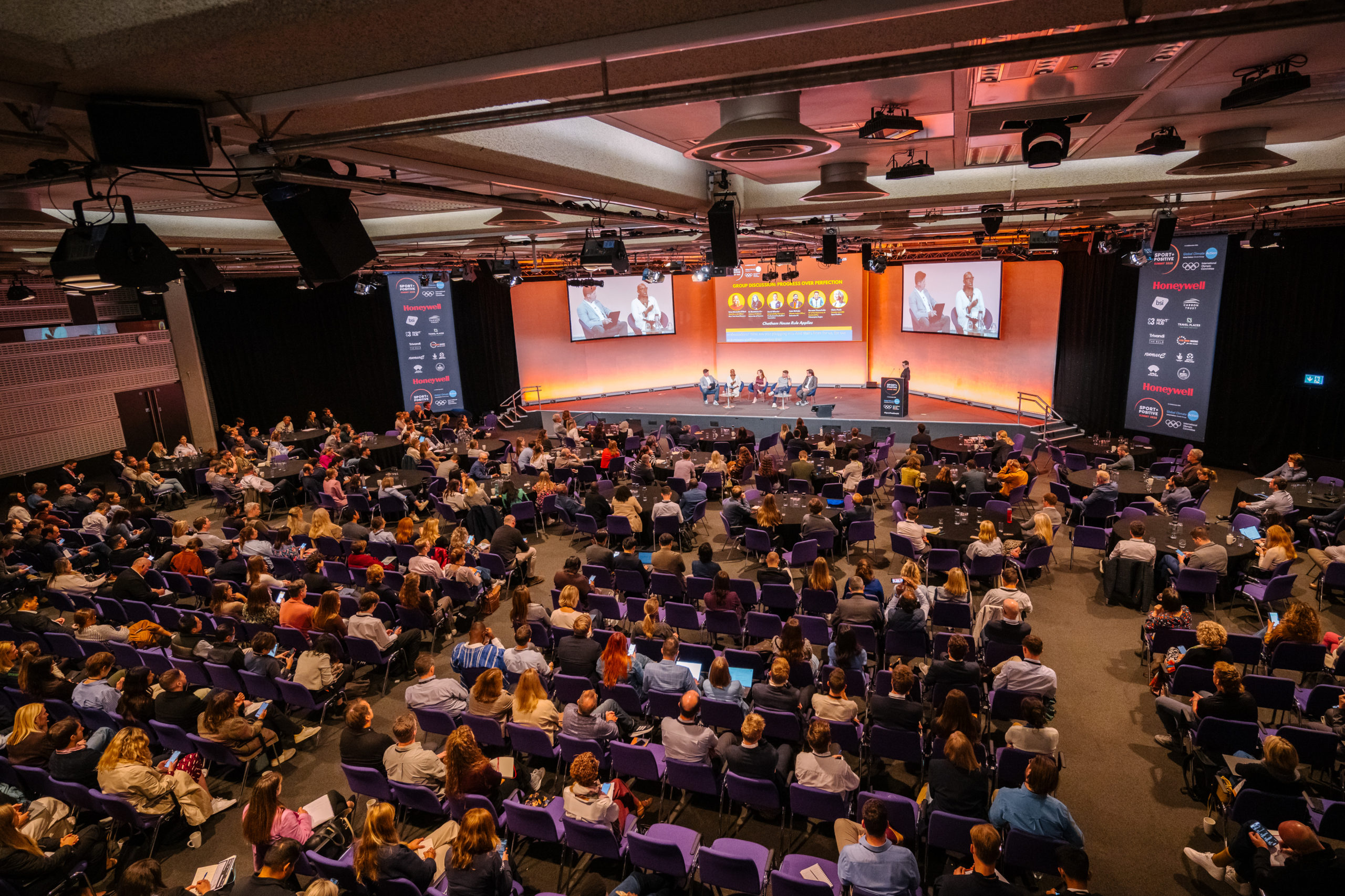
Sport as a Universal Force for Climate Action
“Sport is a universal language. It transcends borders, language and people.”
– Lindita Xhaferi Salihu, Sectors Engagement in Climate Action Lead, UNFCCC
Again and again, speakers reinforced that sport isn’t just about hitting net zero – it’s about engaging and inspiring communities. The sector acknowledged a core problem: climate action often fails to connect to people’s daily lives.
Sport can bridge that gap. It offers powerful storytelling, real-world examples of resilience, and a platform that reaches millions.
Fact: Surf clubs in California delivered more aid in the first week of LA wildfires than the Red Cross. That’s the power of organized, passionate communities in motion.
The conversation shifted from challenge to opportunity: “What do we have to lose?” became “What can we gain?”
Sport can drive:
- Better livelihoods
- Stronger communities
- Shared climate solidarity and adaptation
And most importantly, sport knows how to speak to people in their own language: “Don’t talk sustainability. Talk about transport, saving money, pride, convenience.” – John Muddeman, Event Director, World Boxing Championships
The beauty of sport is that it reaches different people in different ways. That is exactly what the climate movement needs.
From Awareness to Agency: Just Start, But Start Smart
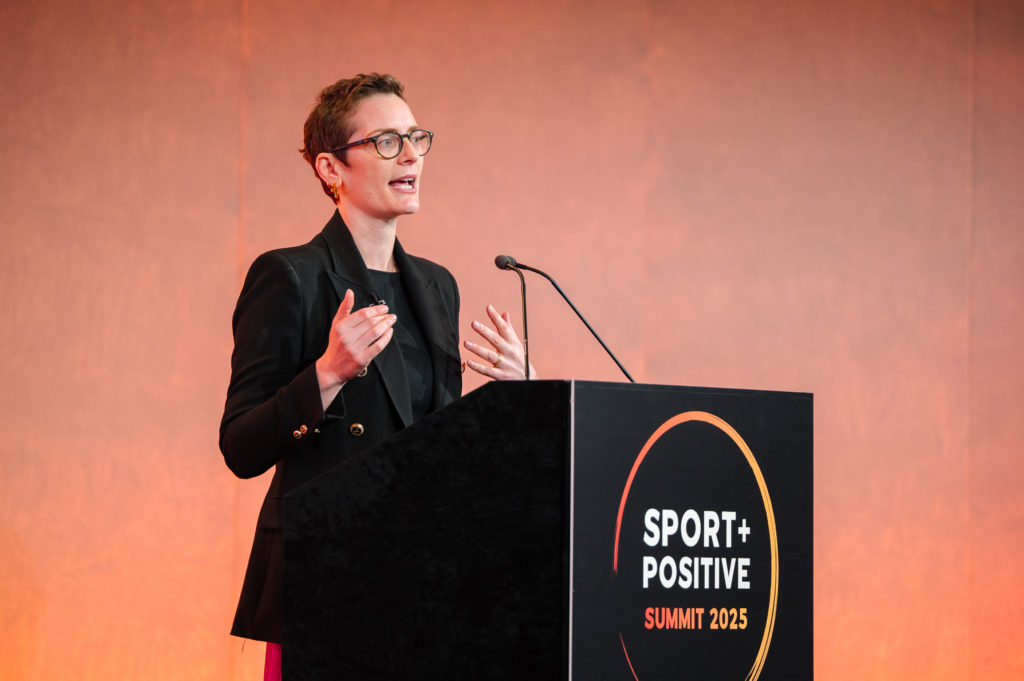
The sector is done with “raising awareness” alone. “We’re shifting from awareness to agency.”- Claire Poole, Founder of Sport Positive
The new direction: Strategic action + practical momentum.
- Start with an audit and clear strategy. (Check out The Toolbox Step 2 – How to Create a Sustainability Policy)
- Then take action, even while the plan evolves. (See The Toolbox Step 6 – How to Plan and Implement)
- “Just start doing stuff,” said David Wheeler, former EFL League 1 footballer. “Once you do, clarity comes.”
Authenticity and transparency also took center stage. “Be vulnerable with your own hypocrisy. It gives others permission not to be perfect.” – David Wheeler.
This honesty breaks down barriers and builds trust. Because perfection is not today’s goal, progress is.
Power Partnerships & Innovation
One of the biggest themes of the Summit: no one can do this alone.
“You have to be a bit delusional to create something that isn’t there.” – Sheila Nguyen, Co-Founder & Non- Executive Director, Sports Environment Alliance
Partnerships are no longer about slapping logos together; they’re about solving real problems. Eve Joseph from British Triathlon shared how the Clean Water Alliance wasn’t built around existing partners. They defined the problem first, then asked: who do we need to solve it?
If something doesn’t exist, build it. And if you can’t build it, find someone who can.
Innovation is everywhere:
- The European Space Agency is working with the International Ski and Snowboard Federation to leverage satellite science for actionable event data.
- Procurement is now a climate lever. Levy UK + Ireland, caterers for major sporting complexes in the UK and Ireland, is using its buying power to scale innovations like Notpla’s seaweed-based, biodegradable food packaging.
Partnerships also need structure:
“Sometimes formalities, legal frameworks, and policy are necessary. You need carrot AND stick.” – Eve Joseph. “Push your partners to innovate and scale up to meet standards.” – Susanna Sieff, Sustainability Director, International Ski and Snowboard Federation.
Partnerships are no longer just supportive; they can be transformational.
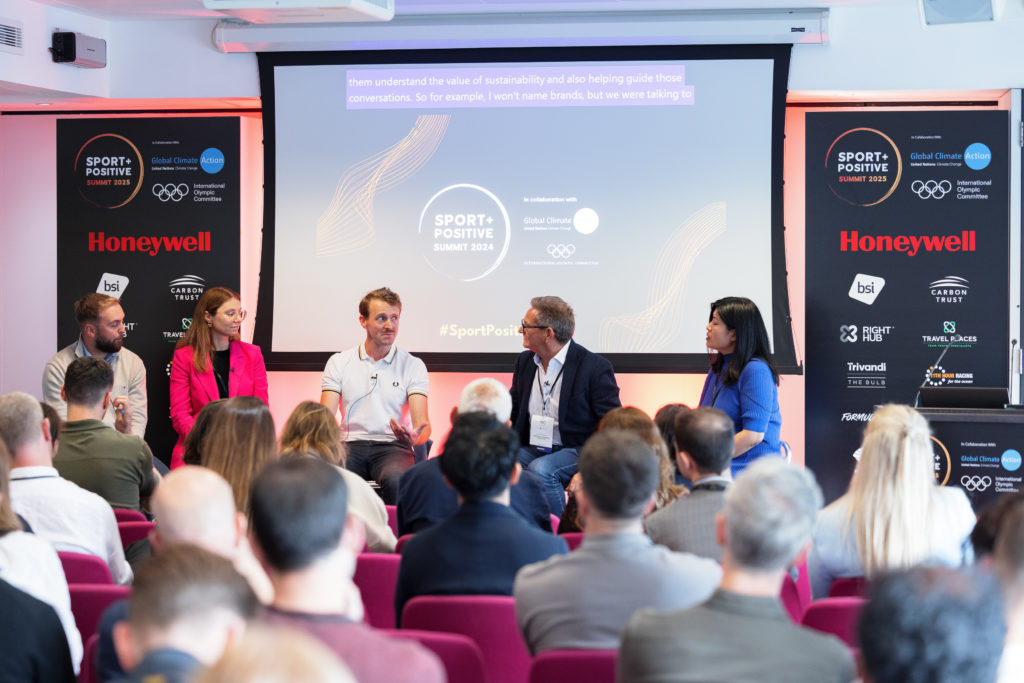
Financing the Future: Sustainability as an Asset
Sustainability isn’t a cost center anymore. It’s value. It’s investment. It’s a competitive advantage.
“Sustainability is a legacy asset. It should be treated like an asset.” – Rupert Robinson, an Independent Sustainable Finance Lead. He introduced the idea of a “sustainability dividend”: economic return generated through purpose.
Rupert proposed some examples of financial innovations for insetting sustainability:
- FC Barcelona is testing ‘micro carbon’ pricing model that connects carbon directly to the fan experience. This is done by adding slight price premiums to the ticket price, food and merchandise that is directly related to the cost of carbon impact.
- Green bonds and long-term financing are entering the conversation.
- Consider who you are banking with and where investments such as pensions sit – do you know whether your organizational and personal finances are supporting oil, gas and arms?
Sport venues and resident teams are like mini cities with their own economies. Why aren’t we treating them that way? One big challenge remains: “What company plans 25 years ahead? And yet we are planning for net zero.” – Simona Jakubkaite, Director, ESG Impact and Engagement, Liberty Global
As sport leaders consider their carbon footprints, they must also consider: “Scope F” = Fans. They aren’t just attendees; they are stakeholders in both the impact and the solution.
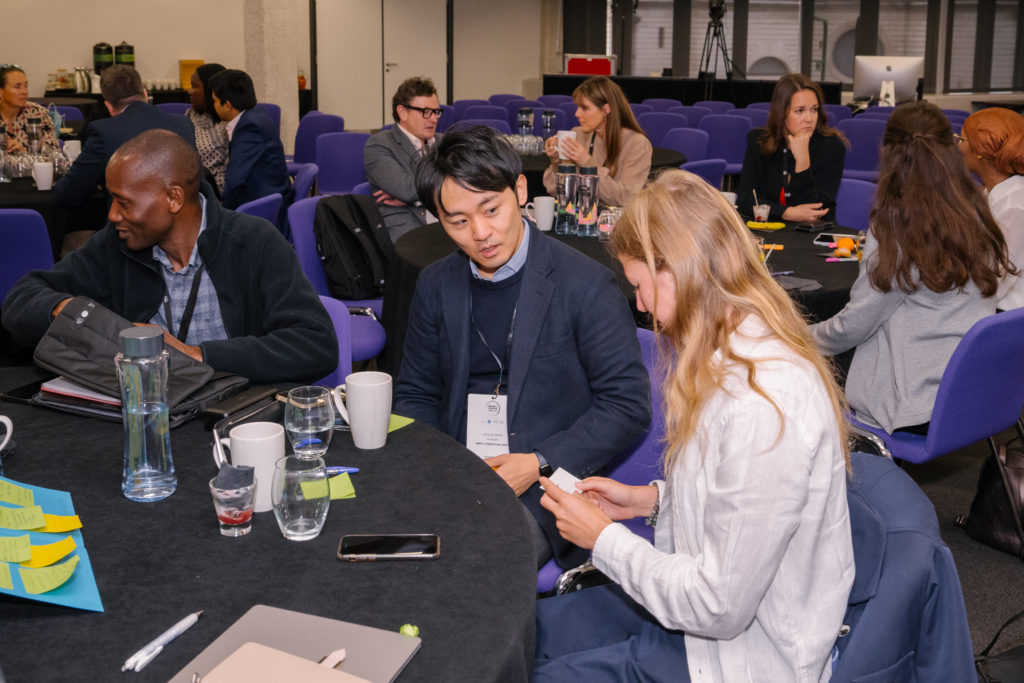
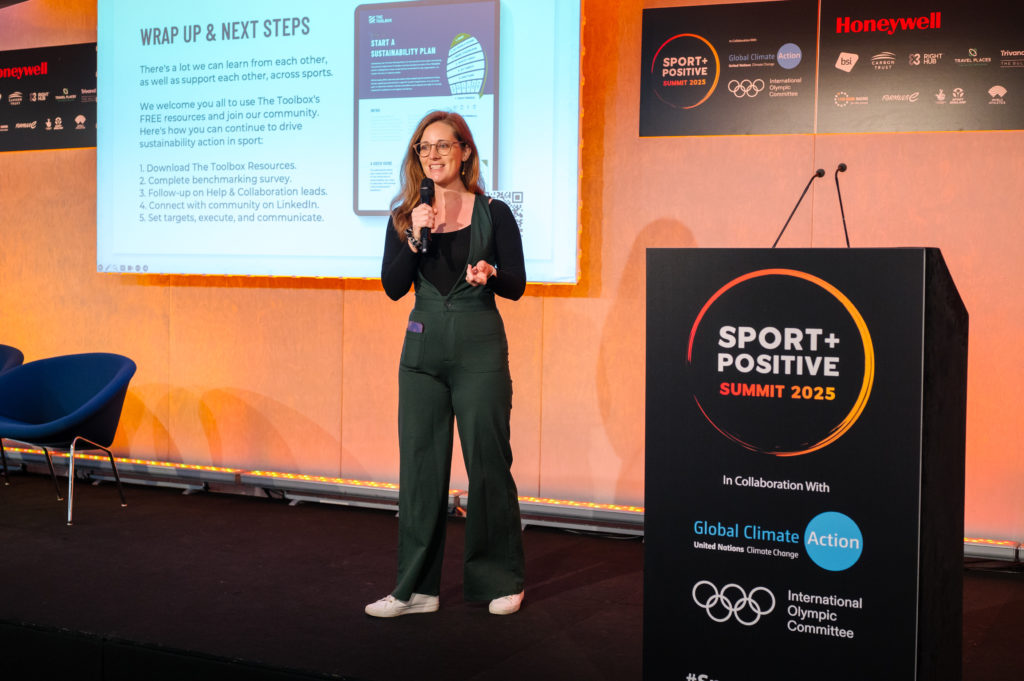
The Sustainability Toolbox Benchmarking Breakfast
One of the most energizing moments of the Summit came from outside the main stage.
The Sustainability Toolbox team hosted a Benchmarking Breakfast, and the room was packed with power and potential with around 30 attendees from all corners of the sector:
- KPMG Japan
- University of Toronto
- Kenya & Barbados Olympic Committees
- 11th Hour Racing
- Mer Concept
…and leaders from federations, events, venues, and sailing organizations worldwide.
The format of the workshop was simple but powerful. Everyone shared:
- One thing they needed help with
- One thing they could help others with
This sparked honest, peer-to-peer exchange, which was a core highlight of the Summit. If the Summit proved anything, it’s this: We don’t need more awareness. We need people to pick up the tools, collaborate, and do.
That’s exactly why The Sustainability Toolbox exists. The free templates, trackers, guides, and case studies make sustainability action accessible to anyone. Sign up for free resources at The Sustainability Toolbox and turn this momentum into measurable impact.
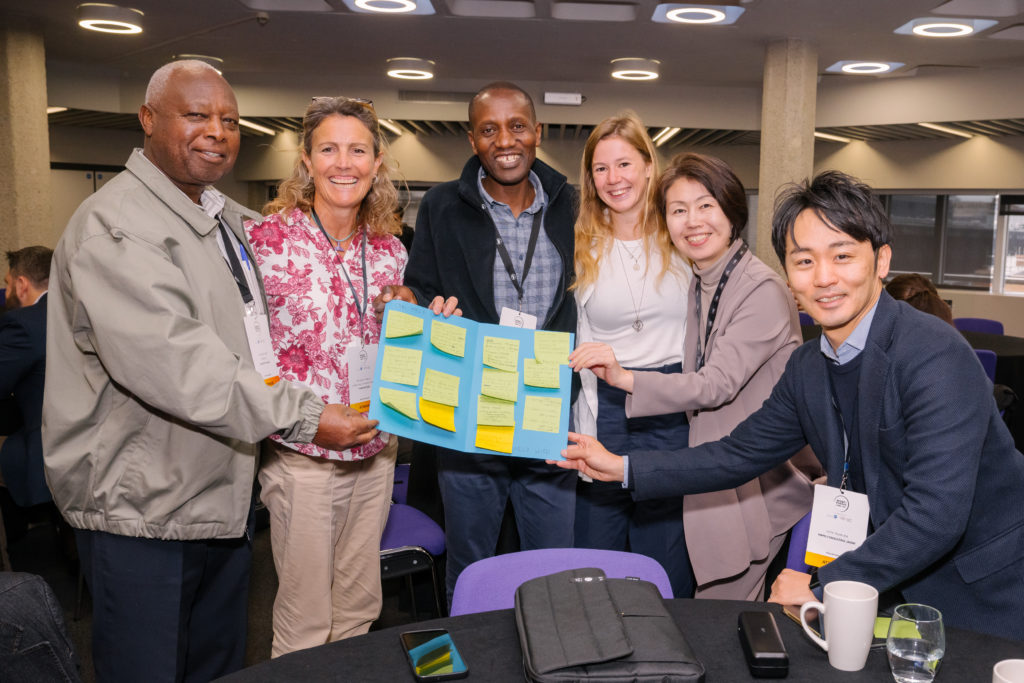
Sailing Strong in Sustainability
The sailing community was well represented at the Sport Positive Summit, with several initiatives being recognized at the Sport Positive Awards. Represented across categories, shortlisted honorees included: the Marine Mammal Advisory Group for Biodiversity Award; World Sailing’s Sustainability Sessions for Education and Training Award; and UpWind by MerConcept | 11th Hour Racing for Purpose-led Partnership Award.
Thanks to the support of 11th Hour Racing, who are a common thread throughout sustainability leadership in the sailing industry. Learn more about 11th Hour Racing’s philanthropic work that drives ocean action here.
